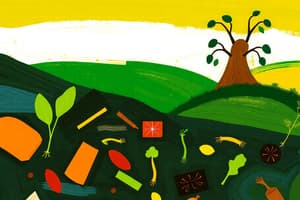Podcast
Questions and Answers
Flashcards are hidden until you start studying
Study Notes
Agricultural Waste
- Agricultural waste refers to waste generated from planting, harvesting, trimming, pruning of plants, and waste or run-off materials from farms or fields.
Crop Residues
- Crop residues are chemically complex organic materials that play a crucial role in maintaining soil productivity by providing nutrients and inputs to organic matter.
- Examples of crop residues include rice straw, corn stalks, and cobs.
- Characteristics of crop residues, such as carbon to nitrogen (C:N) ratio, affect their decomposition rate.
- Materials with high C:N ratio take longer to decompose, while those with low C:N ratio decompose faster.
Farm Manure
- Farm manure is a cheap source of plant nutrients and a valuable soil amendment to improve soil quality.
Agri-Industrial Wastes
- Agri-industrial wastes are generated as by-products of agricultural crop processing.
- Examples of agri-industrial wastes include sugarcane bagasse, rice hull, carbonized rice hull, and coir dust.
- These wastes are valuable sources of raw materials for organic fertilizer production.
Household and Market Wastes
- Household and market wastes are better sources of compost materials due to their low C:N ratio.
- Wet household garbage includes kitchen wastes such as food leftovers, fruits, vegetable peelings, and fish wastes.
- Dry household garbage includes garden wastes such as plants, leaf litters, and tree branches.
- Wet market wastes include solid fruit, vegetable wastes, solid biodegradable from slaughterhouses, and food leftovers from canteens and restaurants.
What is Compost?
- Compost is a natural, rich soil-like material created by the biological decomposition of organic materials like vegetative debris and livestock manures.
- It is a low-cost, organic fertilizer made by the farmer himself.
Benefits of Compost
- Compost improves the quality of soil, making it a soil conditioner.
- It contains basic nutrients required for healthy plant growth, including Nitrogen, Phosphorus, and Potassium.
- Compost also contains micronutrients like manganese, copper, iron, and zinc, which help control diseases and insects.
- It improves soil structure and texture, enabling it to retain nutrients, moisture, and air for better plant growth.
- Compost helps with manure handling and reduces its environmental impact.
Why Compost?
- Composting is a natural fit for farmers who cannot buy fertilizers.
- It allows for efficient management of biological decomposition of organic matter.
- All necessary ingredients are readily available on the farm, including stock and bulking materials.
Advantages of Composting
- Increases the level of organic matter in soil, benefitting soil organisms, structure, infiltration, water retention capacity, and aggregate stability.
- Compost is rich in nutrients readily available to plants.
- Diseases, pests, and weed seeds are destroyed due to the high temperature of composting.
Disadvantages of Composting
- Composting is labor-intensive.
- Organic materials may be scarce.
- Compost can attract vermin and produce a strong odor.
Microorganisms Involved in Composting
- Bacteria: the smallest living organisms and most numerous in compost.
- Actinomycetes: responsible for the earthy smell of soil.
- Fungi: decompose complex plant polymers in soil and compost.
- Protozoa: one-celled microscopic animals.
- Rotifers: microscopic, multicellular organisms found in films of water.
- Earthworms: the most important physical decomposers in compost piles.
Studying That Suits You
Use AI to generate personalized quizzes and flashcards to suit your learning preferences.




